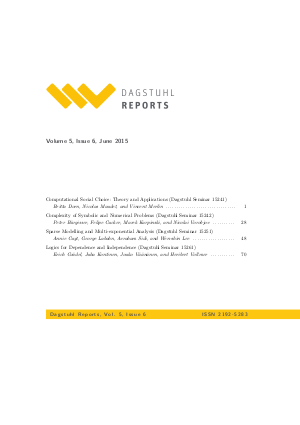Dagstuhl Reports, Volume 5, Issue 6
-
Part of:
Volume:
Dagstuhl Reports, Volume 5
Journal: Dagstuhl Reports (DagRep)

Event
- Dagstuhl Seminars 15241, 15242, 15251, 15261
Publication Details
- published at: 2016-02-29
- Publisher: Schloss Dagstuhl – Leibniz-Zentrum für Informatik
- DBLP: db/journals/dagstuhl-reports/dagstuhl-reports5
Access Numbers
- Detailed Access Statistics available here
-
Total Document Accesses (updated on a weekly basis):
0PDF Downloads
Documents
Dagstuhl Reports, Volume 5, Issue 6, June 2015, Complete Issue
Abstract
Cite as
Dagstuhl Reports, Volume 5, Issue 6, Schloss Dagstuhl – Leibniz-Zentrum für Informatik (2016)
Copy BibTex To Clipboard
@Article{DagRep.5.6,
title = {{Dagstuhl Reports, Volume 5, Issue 6, June 2015, Complete Issue}},
journal = {Dagstuhl Reports},
ISSN = {2192-5283},
year = {2016},
volume = {5},
number = {6},
publisher = {Schloss Dagstuhl -- Leibniz-Zentrum f{\"u}r Informatik},
address = {Dagstuhl, Germany},
URL = {https://drops.dagstuhl.de/entities/document/10.4230/DagRep.5.6},
URN = {urn:nbn:de:0030-drops-57707},
doi = {10.4230/DagRep.5.6},
annote = {Keywords: Dagstuhl Reports, Volume 5, Issue 6, June 2015, Complete Issue}
}
Dagstuhl Reports, Table of Contents, Volume 5, Issue 6, 2015
Abstract
Cite as
Dagstuhl Reports, Volume 5, Issue 6, pp. i-ii, Schloss Dagstuhl – Leibniz-Zentrum für Informatik (2016)
Copy BibTex To Clipboard
@Article{DagRep.5.6.i,
title = {{Dagstuhl Reports, Table of Contents, Volume 5, Issue 6, 2015}},
pages = {i--ii},
journal = {Dagstuhl Reports},
ISSN = {2192-5283},
year = {2016},
volume = {5},
number = {6},
publisher = {Schloss Dagstuhl -- Leibniz-Zentrum f{\"u}r Informatik},
address = {Dagstuhl, Germany},
URL = {https://drops.dagstuhl.de/entities/document/10.4230/DagRep.5.6.i},
URN = {urn:nbn:de:0030-drops-57691},
doi = {10.4230/DagRep.5.6.i},
annote = {Keywords: Dagstuhl Reports, Table of Contents, Volume 5, Issue 6, 2015}
}
Computational Social Choice: Theory and Applications (Dagstuhl Seminar 15241)
Abstract
Cite as
Craig Boutilier, Britta Dorn, Nicolas Maudet, and Vincent Merlin. Computational Social Choice: Theory and Applications (Dagstuhl Seminar 15241). In Dagstuhl Reports, Volume 5, Issue 6, pp. 1-27, Schloss Dagstuhl – Leibniz-Zentrum für Informatik (2016)
Copy BibTex To Clipboard
@Article{boutilier_et_al:DagRep.5.6.1,
author = {Boutilier, Craig and Dorn, Britta and Maudet, Nicolas and Merlin, Vincent},
title = {{Computational Social Choice: Theory and Applications (Dagstuhl Seminar 15241)}},
pages = {1--27},
journal = {Dagstuhl Reports},
ISSN = {2192-5283},
year = {2016},
volume = {5},
number = {6},
editor = {Boutilier, Craig and Dorn, Britta and Maudet, Nicolas and Merlin, Vincent},
publisher = {Schloss Dagstuhl -- Leibniz-Zentrum f{\"u}r Informatik},
address = {Dagstuhl, Germany},
URL = {https://drops.dagstuhl.de/entities/document/10.4230/DagRep.5.6.1},
URN = {urn:nbn:de:0030-drops-55050},
doi = {10.4230/DagRep.5.6.1},
annote = {Keywords: Computational Social Choice, Voting, Matching, Fair Division}
}
Complexity of Symbolic and Numerical Problems (Dagstuhl Seminar 15242)
Abstract
Cite as
Peter Bürgisser, Felipe Cucker, Marek Karpinski, and Nicolai Vorobjov. Complexity of Symbolic and Numerical Problems (Dagstuhl Seminar 15242). In Dagstuhl Reports, Volume 5, Issue 6, pp. 28-47, Schloss Dagstuhl – Leibniz-Zentrum für Informatik (2016)
Copy BibTex To Clipboard
@Article{burgisser_et_al:DagRep.5.6.28,
author = {B\"{u}rgisser, Peter and Cucker, Felipe and Karpinski, Marek and Vorobjov, Nicolai},
title = {{Complexity of Symbolic and Numerical Problems (Dagstuhl Seminar 15242)}},
pages = {28--47},
journal = {Dagstuhl Reports},
ISSN = {2192-5283},
year = {2016},
volume = {5},
number = {6},
editor = {B\"{u}rgisser, Peter and Cucker, Felipe and Karpinski, Marek and Vorobjov, Nicolai},
publisher = {Schloss Dagstuhl -- Leibniz-Zentrum f{\"u}r Informatik},
address = {Dagstuhl, Germany},
URL = {https://drops.dagstuhl.de/entities/document/10.4230/DagRep.5.6.28},
URN = {urn:nbn:de:0030-drops-55066},
doi = {10.4230/DagRep.5.6.28},
annote = {Keywords: Symbolic computation, Algorithms in real algebraic geometry, Complexity lower bounds, Geometry of numerical algorithms}
}
Sparse Modelling and Multi-exponential Analysis (Dagstuhl Seminar 15251)
Abstract
Cite as
Annie Cuyt, George Labahn, Avraham Sidi, and Wen-shin Lee. Sparse Modelling and Multi-exponential Analysis (Dagstuhl Seminar 15251). In Dagstuhl Reports, Volume 5, Issue 6, pp. 48-69, Schloss Dagstuhl – Leibniz-Zentrum für Informatik (2016)
Copy BibTex To Clipboard
@Article{cuyt_et_al:DagRep.5.6.48,
author = {Cuyt, Annie and Labahn, George and Sidi, Avraham and Lee, Wen-shin},
title = {{Sparse Modelling and Multi-exponential Analysis (Dagstuhl Seminar 15251)}},
pages = {48--69},
journal = {Dagstuhl Reports},
ISSN = {2192-5283},
year = {2016},
volume = {5},
number = {6},
editor = {Cuyt, Annie and Labahn, George and Sidi, Avraham and Lee, Wen-shin},
publisher = {Schloss Dagstuhl -- Leibniz-Zentrum f{\"u}r Informatik},
address = {Dagstuhl, Germany},
URL = {https://drops.dagstuhl.de/entities/document/10.4230/DagRep.5.6.48},
URN = {urn:nbn:de:0030-drops-55073},
doi = {10.4230/DagRep.5.6.48},
annote = {Keywords: Sparse Interpolation, Exponential Analysis, Signal Processing, Rational Approximation}
}
Logics for Dependence and Independence (Dagstuhl Seminar 15261)
Abstract
Cite as
Erich Grädel, Juha Kontinen, Jouka Väänänen, and Heribert Vollmer. Logics for Dependence and Independence (Dagstuhl Seminar 15261). In Dagstuhl Reports, Volume 5, Issue 6, pp. 70-85, Schloss Dagstuhl – Leibniz-Zentrum für Informatik (2016)
Copy BibTex To Clipboard
@Article{gradel_et_al:DagRep.5.6.70,
author = {Gr\"{a}del, Erich and Kontinen, Juha and V\"{a}\"{a}n\"{a}nen, Jouka and Vollmer, Heribert},
title = {{Logics for Dependence and Independence (Dagstuhl Seminar 15261)}},
pages = {70--85},
journal = {Dagstuhl Reports},
ISSN = {2192-5283},
year = {2016},
volume = {5},
number = {6},
editor = {Gr\"{a}del, Erich and Kontinen, Juha and V\"{a}\"{a}n\"{a}nen, Jouka and Vollmer, Heribert},
publisher = {Schloss Dagstuhl -- Leibniz-Zentrum f{\"u}r Informatik},
address = {Dagstuhl, Germany},
URL = {https://drops.dagstuhl.de/entities/document/10.4230/DagRep.5.6.70},
URN = {urn:nbn:de:0030-drops-55084},
doi = {10.4230/DagRep.5.6.70},
annote = {Keywords: team semantics, dependence logic, mathematical logic, computational complexity, finite model theory, game theory}
}